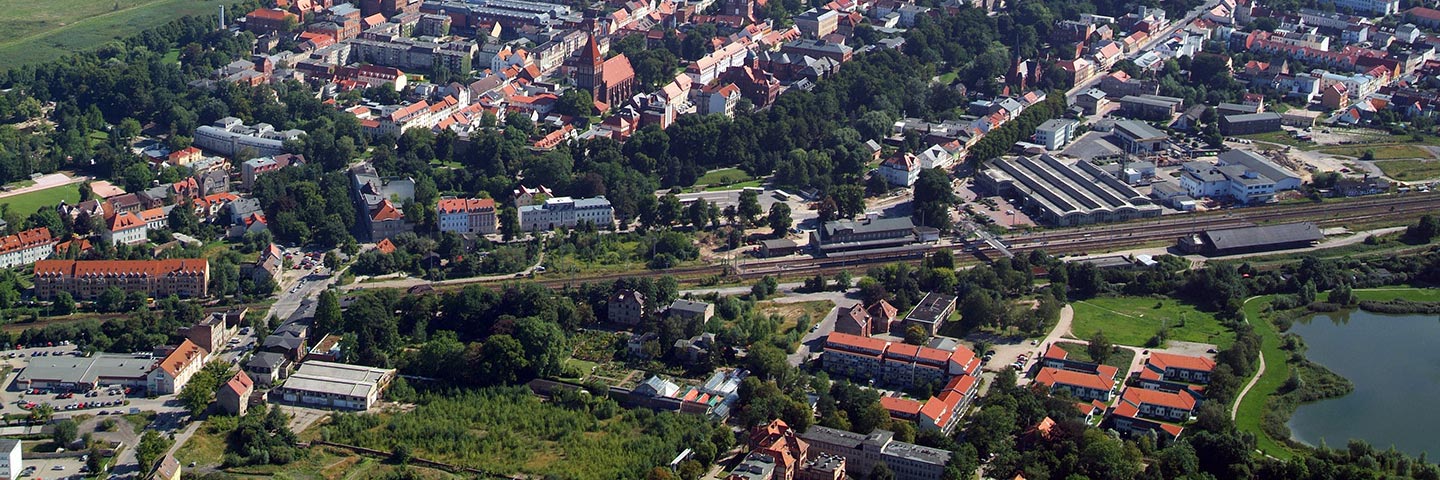News/All pieces
Leidissoo mire in Estonia
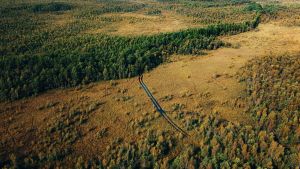
Wet again!
18/02/2026 In December 2025, the final stages of the rewetting of drained parts of the Leidissoo mire complex in north-western Estonia were successfully completed. A film ( United for Peatland Protection: Restoration of Estonia’s Leidissoo Peatland) provides insights into the implementation of the project.
The project, which was launched in 2022, entered the implementation phase in spring 2025 after a comprehensive planning and approval. The restoration measures included closing around 100 kilometres of drainage ditches by constructing more than 500 dams. The aim of the measures is to restore the peatlands natural water balance and thus secure the ecological functions of the ecosystem in the long term, including the positive impact on global climate. Even during implementation on an area of over 800 hectares, initial successes were immediately visible, aided by an exceptionally wet summer.
What happens next?
In spring 2026, after the snow has melted and the spring floods have subsided, the Estonian Forest Management Centre (RMK) will make an initial assessment of the success of the rewetting. This will be followed by long-term monitoring to systematically record the hydrological and ecological development of the rewetted areas.
The Leidissoo mire is situated in a designated nature reserve and plays a central role in the conservation of near-natural mire ecosystems. The rewetting makes a significant contribution to climate change mitigation by reducing CO₂ emissions from drained peat soils.
The protected area comprises three mire complexes – Leidissoo, Sendrisoo and Musa – and combines all types of mires typical for western Estonia: fens, transition mires and raised bogs. It is rich in species and provides a habitat for rare bird and plant species such as golden eagles, white-tailed eagles, capercaillies, bog orchids, heath sedge, and brown beak sedge. Its special value lies in the size of the area and the richness of its bog and forest habitats.
This exemplary project shows that privately funded climate protection projects – such as this one by the Succow Foundation, partner in the Greifswald Mire Centre, PlanBe, HIT Environmental Foundation and RMK – can also make an important contribution to the restoration of ecosystems and achieving European climate protection goals.
Paludiculture – how to?
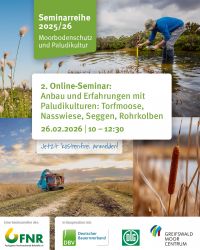
Online seminar on cultivation and harvesting
14/02/2026 On 26 February 2026, FNR and Greifswald Mire Centre will be offering another webinar in the free online series ‘Peatland Protection and Paludiculture’. From 10 a.m. to 12.30 p.m., the focus will be on ‘Cultivation and experiences with paludiculture: peat mosses, wet meadows, sedges, cattails’
Content:
-
Cultivation of various paludicultures: e.g. peat mosses, wet meadow biomass
-
Technology, maintenance, harvesting – practical examples
-
Water control, mechanical cultivation, establishment
-
Processing of paludiculture biomass (e.g. MoorFasern)
Also included:
-
‘Sphagnum moss paludiculture: experiences from 20 years of research, development and practice’
Dr Greta Gaudig, University of Greifswald, MOOSland project coordinator -
‘Combined climate protection: land use for MoorFasern – MooReturn project’
Ludwig Bork, farmer and managing director of Agrotherm GmbH - ‘Experience gained from 20 years of wet cultivation’
Frank Havemeyer, Managing Director of Niedersächsisches Landvolk Kreisverband Osterholz e.V.
Special features
-
Interactive format with room for dialogue and discussion
-
Goal: exchange, knowledge transfer and cross-sector cooperation
-
Invitation to participants to contribute their own expertise and gain new perspectives
World Wetland Day
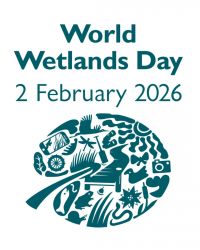
A Year in Peatlands
2 February 2026 To mark International Wetlands Day on 2 February, the Greifswald Moor Centre is announcing a new series of events: ‘A Year in Peatlands’. Every month, an excursion will give interested parties the opportunity to explore the diverse peatland landscape in and around Greifswald and in Vorpommern.
In summer, participants can experience individual topics such as biodiversity, history of use and paludiculture in the field. In the winter months, participants can keep warm while working or sit in the cosy peatland library.
Here are the upcoming dates:
On 7 February, it's time to get stuck in at Mannhagen Moor. Together, we will clear young trees from the peatland to protect rare species. Hot soup will be provided during the lunch break.
On 16 March, the excursion will take us to the ‘treasure on the coast’, the Drammendorf polder on Rügen, with lots of information about renaturation and current research in this coastal peatland.
On 25 April, we will see whether peatland protection and use can be combined. The Bargischow Süd polder is being converted to wet cultivation (paludiculture).
On 9 May, we will experience the sound of a coastal flood peatland while observing breeding birds on the Karrendorfer Wiesen. In addition to fascinating bird calls, participants will learn all about the history of use and nature conservation measures in the area.
Whether natural, utilised, degraded or rewetted – the excursions take place in areas with very different conditions and functions. They are open to anyone interested, are free of charge, but require online registration.
All information here: A Year in Peatlands – Greifswald Moor Centre
Background: World Wetlands Day
Since 1997, World Wetlands Day (WWD) has been held annually on 2 February to raise awareness of the importance of wetlands, including peatlands. On 2 February 1971, the Ramsar Convention, the international agreement on the protection of wetlands, was adopted. Since 2021, it has been recognised as an international day by the United Nations. Pollution, drainage and agriculture, fires and overfishing have threatened or already destroyed wetlands, including peatlands, worldwide. Yet they are guarantors of biodiversity and climate protection. Among other things, they offer people protection against drought and flooding, purify water and regulate the microclimate. In Germany, 95% of the former peatlands have been drained and are no longer recognisable as such today.
How does Typha germinate?
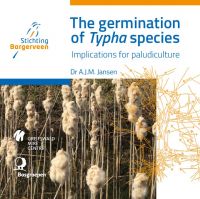
New brochure
27/01/2026 Andre Jansen set to find how Typa germinates and what it means for the future of paludiculture – a climate-smart way of farming on rewetted peatlands. Because wet agriculture can help to protect peatlands while still producing valuable biomass!
The result: the brochure "The germination of Typha species" now available online! Based on an extensive literature review, it translates ecological knowledge into practical insights for sustainable land use and restoration.
Five key takeaways:
1️⃣ Typha species produce enormous amounts of viable seeds, making sowing a promising and cost-effective alternative to planting.
2️⃣ Water regime is the key driver: fluctuating water levels strongly influence germination and seedling establishment.
3️⃣ Typha seeds germinate fast and reliably under the right conditions, especially with sufficient light and temperature.
4️⃣ The species’ ability to form persistent seed banks allows rapid colonisation after rewetting events.
5️⃣ Understanding germination ecology is essential for successful paludiculture and peatland conservation.
📖 Discover more in the full brochure here
Well peaty & spongy
Expert forum at the Future Forum on Rural Development at Green Week
19/01/2026 How can water be retained in the landscape? This is the topic of the expert forum on sponge landscapes and paludiculture on 21 January at Green Week. Water is key to making agricultural landscapes resilient to the effects of the climate crisis. The forum will provide best practice examples of how agriculture, nature conservation and local authorities can achieve this through water meadows, controllable drainage, agroforestry systems, humus formation or peatland rewetting and paludiculture. The speakers Corinna Friedrich and Thomas Köhler (DVL), Josef Sedlmeier (Regensburg Landscape Conservation Association) and Dr Franziska Tanneberger (co-director of the Greifswald Moor Centrum) will also discuss the framework conditions and transferability of practical experience to other regions.
The expert forum will take place from 2:30 to 4 p.m. in Room A6 in the City Cube and can also be followed via livestream. It is organised by the German Association for Landscape Conservation (DVL) in cooperation with the Greifswald Mire Centre.
Paludi Summer School 2026
Only a few places left!
10/01/2026 Last chance: There are only a few places left for the nine-day Paludi Summer School in June 2026. Doctoral students and early-career scientists who are looking for expertise and want to network can still register until 31st January.
The Paludi Summer School will take place from 8 to 17 June 2026 at the Thünen Institute in Braunschweig and the Greifswald Moor Centrum.
The main goal is to strengthen interdisciplinary exchange and to connect participants with each other as well as with experts from research and practice. The focus is on jointly developing and deepening knowledge about paludiculture. The programme is supplemented by practical tasks, interactive workshops and excursions to project sites, rounded off by several leisure activities that provide opportunities for exchange and networking. Each participant is asked to give a presentation on their own research topic – an opportunity to share ideas, receive feedback and learn from each other.
Registrations are possible using this form. The Paludi Summer School is organised by the PaludiZentrale project.
From Peatland to market
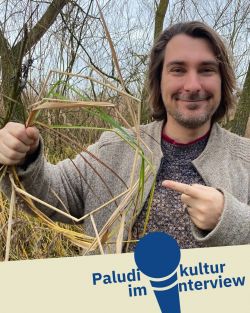
LCA for paludiculture – how does it work?
Greifswald, 7 January 2026 Clemens Kleinspehn is working at the University of Greifswald on the PaludiAllianz project to calculate the environmental impact over the entire life cycle – a so-called Life Cycle Analysis (LCA) – for a paludiculture product. His focus: the OTTO Group's shipping carton, which consists of 10% biomass from wet moors.
In the latest Paludiculture interview, he explains that this primarily provides the basis for the economic competitiveness of paludiculture products. The challenge here is that international life cycle assessment databases currently lack data on paludiculture products. Clemens Kleinspehn not only shows how the project closes these data gaps, but also which competing products may provide an orientation and which impact categories, such as water and energy consumption, biodiversity and greenhouse gas emissions, it focuses on. He also addresses the importance of LCA transparency, as there are no binding standards.
The LCA is not only intended to provide scientific findings, but mainly to offer companies and interested consumers a sound basis for decision-making. ‘Climate balances are an important purchasing criterion today,’ emphasises Kleinspehn. ‘Our results will be published so that producers and interested parties can better evaluate paludiculture products.’ The analysis is expected to be completed in six months.
Peatland-PV could do much better
if it was wet
06/01/2026 Good measure, wrong spot: More GHG emitted than saved by sustainable energy – that’s how the greenhouse gas balance on solar power on drained peatlands in Germany looks like so far, this new study in Scientific Reports of @springernature shows:
https://www.nature.com/articles/s41598-025-27952-4
Instead, this could be far better, and solar-PV on peatlands even greener, if … they were wet! Rewetting stops CO2-emissions from drained peatlands nearly immediately and thus prevents harm from continued peat oxidation exceeding the benefit of a clean energy production.
“Newly wet peatlands with suitably designed solar parks could have a combined benefit and can unlock a powerful climate mitigation potential.” says co-author Carl Pump of the University of Greifswald. “But only with smart and careful planning - ideally in cooperation with all relevant stakeholders and authorities.”
165 solar parks have already been built on peatland until December 2023 with a total installed capacity of 643 MWp. In average they provide electricity for 200.000 households per year. Due to generally lower soils scores peatland areas might even have been favoured in the past. A substantial number of these plants receives feed-in tariff. Since 2023 it has been prohibited to receive feed-in tariff for new solar parks built on drained peatlands, making them largely unprofitable.
The study’s key messages:
- No new solar parks on drained peatlands!
- Peatland PV on rewetted soils can substantially contribute to energy transition!
- Through the additional rewetting of the peatland next to the PV, the emission values of a kWh can be even more positive.
-Rewetted peatland PV could also be part of landuse transition to rewet peatland
We wish you rewetted peatlands...
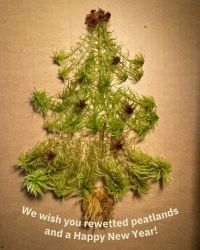
🎵 ...and a Happy New Year!
22/12/2025 This is our peatland twist on the classic Christmas jingle. We send it to all peatland lovers and hope for it to become as true as possible in 2026.
As 2025 comes to a close, we want to thank all our friends, followers, and partners for your support of the Greifswald Mire Centre. Together, we’ve made strides in peatland protection, research, and advocacy. Here’s to even more impactful collaborations and dedicated peatland action in 2026! ✨
Paludiculture Newsletter
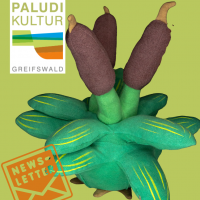
New Issue
17/12/2025 The new Paludiculture Newsletter 4|2025 is here! These are our topics:
- Cuddling with peatland: Artist Daniel Hengst creates textile peatland plants that embody paludiculture
- Peatlands post-COP30: What was achieved for peatlands at the World Climate Conference in Belém and what are the prospects for upcoming COPs? Assessments by Franziska Tanneberger
- From peatland to market: Clemens Kleinspehn analyses the environmental impact of a paludiculture product over its entire life cycle. Why this is important? Read the interview!
- Anti-mud mats from peatlands – paludiculture biomass helps at the Wacken Festival
- Sneak peek at PaludiScout: The central platform for specialised technology for managing wet areas will launch soon.
- Opening: The Peatland Library in Greifswald now has a new home – find out more about this repository of knowledge and meeting place.
Plus: more topics and current dates in the event calendar!
We enjoy staying in touch with our readers. What topics would you like to see covered in the Paludiculture Newsletter, and what feedback do you have for us? Feel free to email us at communication@greifswaldmoor.de.
